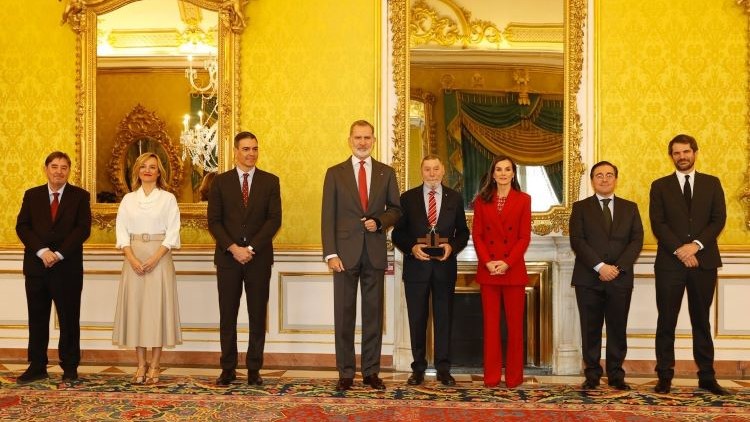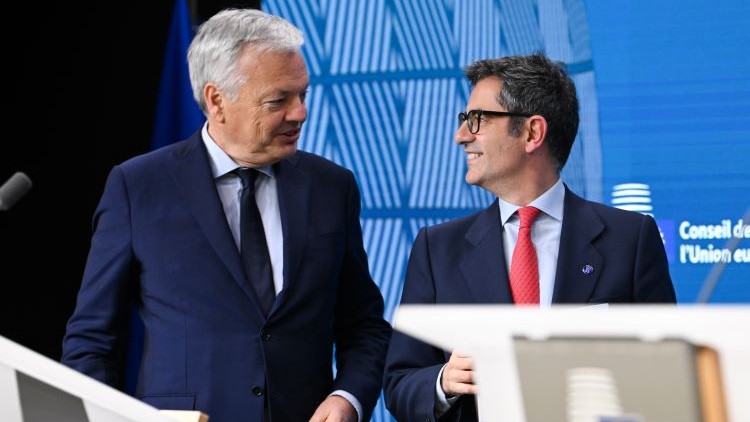Eduardo González
Yesterday, the King and Queen presided over the annual meeting of the Board of Trustees of the Instituto Cervantes, during which Don Felipe described as a “milestone” that the institution has “reached the symbolic goal of being present in one hundred cities around the world.”
“This year, the Instituto Cervantes has reached a symbolic, magnificent goal,” said the Monarch at the toast of the luncheon following the session of the Board of Trustees, which took place at the Royal Palace of Aranjuez (Madrid) and was attended by the President of the Government, Pedro Sánchez, and the Ministers of Foreign Affairs, José Manuel Albares, Education, Pilar Alegría, and Culture, Ernest Urtasun.
“It is already present in one hundred cities around the world, a milestone that marks the future of cultural action and the teaching of Spanish, which will soon be joined by others, such as, for example, the official opening of the center in Seoul, South Korea, in 2024, as well as new extensions in Africa, where our language is one of the most in demand,” he continued. “This is a good moment to celebrate that, in this 2023, the Institute has continued the expansion of its invaluable network of centers around the world,” he added.
The King also highlighted “the digital transformation that the Institute itself is undergoing,” a revolution that “is already having a strong impact on language” and represents a challenge “of enormous significance for the institution and for society.” Felipe VI concluded with a toast “to the 32 years of success of the Instituto Cervantes, watching over our language, over the richness of Spanish, over our valuable common heritage”.
The session of the Board of Trustees – which this year has been delayed with respect to the usual dates, on the eve of the National Holiday of October 12 – began with a speech by the director of the Institute, Luis García Montero, in which he summarized the balance, not only of the last academic year, but also of the last legislature, taking advantage of the fact that the new one has just begun.
Among other figures, García Montero highlighted that transfers from the State have increased from 66.3 million (in 2018) to 80.9 million (this year), and that own income (from tuition, language certification and cultural activities) for the first time will exceed those obtained before the pandemic. It also increased the workforce from 937 (in 2019) to 951 workers, a turnaround when compared to 2012, when there were 1,126 employees, and the successive years, when this number continued to fall. “The deterioration curve of the institution has doubled,” declared the director in a previous meeting with journalists, before whom he demanded “more investment in culture” so that it stops being “the poor sister”, because “investing in culture is not creating clientelism”.
He also informed the trustees about the “profound digital transformation” implemented thanks to the European Recovery Funds (more than 20 million euros have been executed or are in execution), the increase of activities related to the co-official languages and their culture by 34 percent this year (225 percent with respect to 2019), or the aforementioned expansion of centers, classrooms and other minor entities around the world, “after a paralysis of more than ten years”.
García Montero closed his speech with the five objectives for the three-year period 2024-2026: to have more relevance in Spanish cultural diplomacy, to favor the presence of Spanish, to increase the network of centers, to improve the offer of products and services, and to strengthen the organizational structure and human resources.
Ñ Award
Before beginning the meeting, Felipe VI presented the Ñ Award 2023 of the Cervantes Institute to the Hispanist Dieter Ingenschay (1948), an outstanding disseminator of Spanish culture in Germany, professor emeritus of Hispanic Literatures at the Humboldt University of Berlin and former professor of Romance Philology at the University of Munich.
Ingenschay, who chaired the German Association of Hispanists (1998-2003) and has researched and written on Hispanic literatures, declared his joy at “receiving here today the statuette of the letter eñe, the highest honor that can be awarded to a foreign Hispanist”. The prize, he added, “must be understood as an award of German Hispanism as a whole, of a Hispanism abroad that dedicates itself in its research and teaching from the margins to the overflowing creativity of the culture of Spain and its exemplary diversity”.







